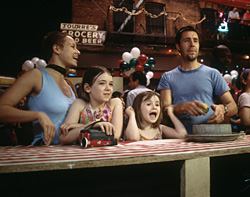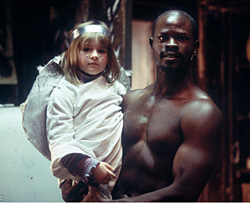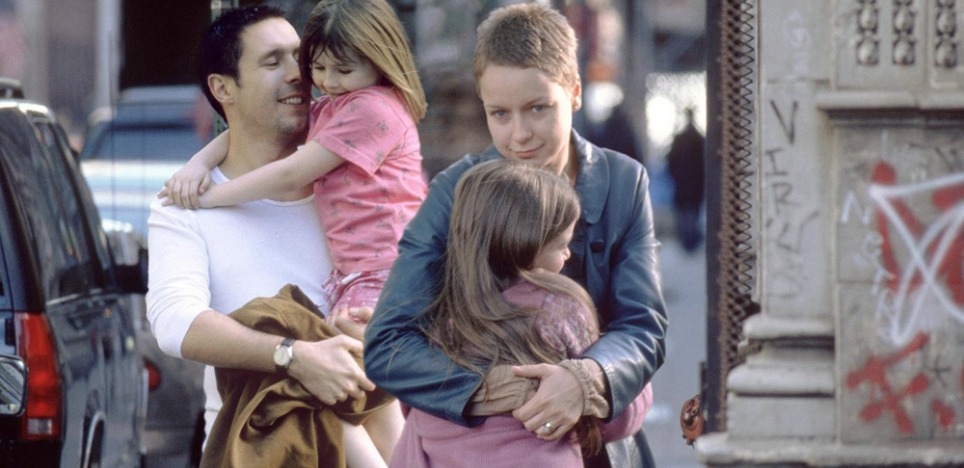"The family is a soul center and apex of spiritual energy," writes psychologist Paul Pearsall. "It is a place where we learn what everything means and how to make everything meaningful." This is certainly true of the family in Jim Sheridan's autobiographical film In America. Johnny and Sarah and their two young daughters, Christy and Ariel, have come to New York City from Ireland. Their situation is enough to try anyone's soul. With very little money and no outside support system, they move into a tenement in a rough neighborhood. Johnny, an actor, can't find work, and the girls feel like outsiders at school. But their greatest challenge is dealing with their grief over the death of another child, Frankie.
Over the course of the film, we see how the family as soul center surrenders to healing. This story offers ample opportunities for discussions about wishing, grief, soul friends, and the spiritual practices of wonder, imagination, and grace. The film runs 107 minutes and is rated PG-13 for some sexuality, drug references, brief violence, and language. For our review and a plot synopsis, click here.
1. Making Wishes
"Wishing falls somewhere between our capacity to reason our way through the secular and our power to pray our way to the sacred. It's one of our innate faculties for dealing with problems and forces that still remain beyond the reach of rigorous logic and blind faith. When we make a wish we contribute our own little boon to the energy pool," Paul Pearsall writes in Wishing Well: Making Your Every Wish Come True.
- Families usually assign different roles to each member. What are the roles given to Johnny, Sarah, Christy, and Ariel? In what scenes do they try to break out of these assigned roles? Why are her three wishes so important to Christy?
- Are you the kind of person who tosses a coin into a fountain or makes a wish upon a star? When you do make wishes, what kinds of things do you ask for? Paul Pearsall calls wishes intentional acts that are "nudging the cosmos." In what ways do you see them as spiritual?

2. Being Glad at Life
"The words 'marvel' and 'miracle' come from an ancient Indo-European root that means to laugh or smile. From the same root comes our word 'admiration.' To wonder is to be glad at life. To admire, to hold worthy, to worship, is to taste the fresh goodness of the world in which we live," Gary Kowalski notes in Science and the Search for God.
- In quite a number of scenes, Christy and Ariel demonstrate their spiritual sense of wonder, or being glad at life. Talk about some of these and the emotional charges they set off in your heart.
- Jesus liked having children around him because of their exuberance for life and their keen sense of wonder. Adults find it more difficult to be awestruck or astonished, especially when we are feeling overwhelmed or underwhelmed. What spiritual practices have you tried to restore and renew your feeling of being glad at life? Have you had any aha! experiences recently? Share your story.
3. Dealing with the Storm Clouds of the Heart
In The Art of Forgiveness, Lovingkindness and Peace, Buddhist writer Jack Kornfield writes: "It takes courage to grieve, to honor the pain we carry. We can grieve in tears or in meditative silence, in prayer or in song. In touching the pain of recent and long-held griefs, we come face to face with our genuine human vulnerability, with helplessness and hopelessness. Those are the storm clouds of the heart."
- This film contains many heartbreakingly truthful scenes of family members confronting the storm clouds of grief — each in his or her own way. Which of these scenes affected you the most? Why? Who is having the most difficulty coping with Frankie's death?
- What emotions have given you the most trouble when you were mourning someone you loved dearly? How did you work through these encounters with helplessness and hopelessness?

4. God's Heart Breaks Too
In The Lord Is My Shepherd, Rabbi Harold Kushner writes about the spiritual message in grief: "As one of America's most prominent clergymen, the Reverend William Sloane Coffin, insisted, reaffirming his faith after the death of his son in an accident, 'God was the first heart to break' . . . God does not, God cannot promise us happy endings in a world where laws of nature and human cruelty take their daily toll. God's promise is not that we will be safe, but that we will never be alone."
- Describe the feelings Johnny has carried about God since Frankie's death. What is your reaction to the scene where he is asked by Ariel to pray with Christy since their mother is in the hospital?
- Does your experience of grieving and your faith in God square with William Sloane Coffin's view? Why or why not?
5. The Power of Imagination
In The Mystery of Love, Marc Gafni states: "The greatest crisis of our lives is neither economic, intellectual, nor even what we usually call religious. It is a crisis of imagination. We get stuck on our path because we are unable to reimagine our lives differently from what they are right now. We hold on desperately to the status quo, afraid that if we let go, we will be swept away by the torrential undercurrents of our emptiness. The most important thing in the world, implies wisdom master Nachman of Breslov, is to be willing to give up who you are for who you might become."
- From their entry into New York when Christy and Ariel see the lights of Times Square to their joy in their grungy tenement apartment, they demonstrate the spiritual practice of imagination, using this wand to infuse delight and positive energy into all that is around them. Which is your favorite scene in this regard?
- Where do you go to energize your imagination? How have you used this spiritual faculty to reimagine what you might become?

6. Places of Grace
In The Heart of Christianity, Marcus Borg uses a metaphor from Celtic Christianity, "thin places" to describe those places and situations that act as mediators of the sacred, "a means whereby the sacred becomes present to us . . . a means of grace." Thin places could be physical locations as well as people, the arts, times of illness, and suffering.
- This film abounds in thin places, where people touch the invisible reality and get in touch with what really matters in life. Which locations and characters serve as thin places in the lives of this Irish family?
- What places of grace have opened your heart recently? Which one was most unexpected or most unusual?
7. Be Thankful for Soul Friends
"Soul friendship, while it can embody many leadership roles and be identified in numerous ways, is always rooted in the heart . . . Whether we are soul friends in our personal relationships or in professional work, being an anamchara is about the graceful art of listening, of discerning, of being attentive to the workings of the heart," Edward C. Sellner writes in The Celtic Soul Friend.
- The friendship that Christy and Ariel establish with Mateo is certainly a heart-to-heart relationship. They become his new family to replace the one that rejected him. Which incidents in the film best convey the tenderness that unfolds between this African-American artist and his Irish neighbors? Talk about your responses to the miraculous interactions that take place between all of them in the closing scenes in the film.
- A soul friend is someone who cherishes our presence and isn't afraid to connect with us on a heart-to-heart level of intimacy. Share a story of how a soul friend has served as a carrier of grace in your life.

This guide is one in a series of more than 200 Values & Visions Guides written by Frederic and Mary Ann Brussat. Text copyright 2003 by Frederic and Mary Ann Brussat. Photos courtesy of Twentieth Century Fox Film Corporation. This guide is posted as a service to visitors to www.SpiritualityandPractice.com. It may not be photocopied, reprinted, or distributed electronically without permission from Frederic and Mary Ann Brussat. For this permission and for a list of other guides in the Values & Visions series and ordering information, email your name and mailing address to: brussat@spiritualrx.com.
